Colbert on Colbert
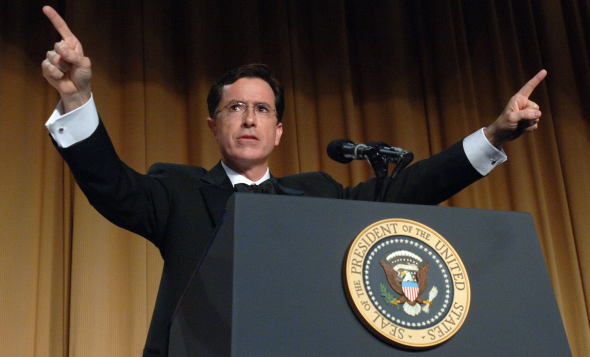 Veteran journalist Jim Warren recounts this weekend’s 50th anniversary celebration at Chicago’s famed Second City comedy troupe. He dutifully claims that “the obvious highlights were Friday and Saturday shows with Martin Short, Steve Carell, Bonnie Hunt, Jim Belushi, George Wendt, Eugene Levy, Andrea Martin, Catherine O’Hara, Harold Ramis, Shelly Berman, Rachel Dratch, Robert Klein, Jack McBrayer and tons more.” He then spends the remainder of a longish essay recounting a conversation with Stephen Colbert and his writers.
Veteran journalist Jim Warren recounts this weekend’s 50th anniversary celebration at Chicago’s famed Second City comedy troupe. He dutifully claims that “the obvious highlights were Friday and Saturday shows with Martin Short, Steve Carell, Bonnie Hunt, Jim Belushi, George Wendt, Eugene Levy, Andrea Martin, Catherine O’Hara, Harold Ramis, Shelly Berman, Rachel Dratch, Robert Klein, Jack McBrayer and tons more.” He then spends the remainder of a longish essay recounting a conversation with Stephen Colbert and his writers.
Of the infamous appearance at the 2006 White House Correspondents’ Association Dinner:
Colbert said he was genuinely surprised that he’d been invited to the affair and, with his colleagues, “worked very hard on it and the actual performance.” It was an honor, a rare opportunity. “The actual performance was enjoyable for me. I really liked the jokes and was eager to do it.”
Tom Purcell, a Second City alum and the television show’s co-executive producer, explained the tactical rationale: Bush, he said, was the typical “Big Man” one might find in innumerable institutional settings. “We thought it was the Big Man. He hires somebody to make fun of him, and he chuckles. You see it at office Christmas parties. You say the boss is so cheap that….and he laughs and everybody laughs. That’s what we thought we were doing. They wouldn’t have brought us in if they didn’t know what jokes we did.”
Of course, in hindsight, that didn’t seem exactly true, suggesting slightly insufficient due diligence by the association.
“We dipped a wick in a can of grape soda, threw it against a wall and little did we know the entire room was soaked in gasoline,” said Purcell. Added Colbert: “We felt like we were throwing joke Molotov cocktails, and then the room burst into flames.” Throughout the panel discussion, gently moderated by NPR’s Peter Sagal, one was reminded of one of the elements separating comic pros, like Colbert and colleagues, from your “hilarious friend” at the office and other funny amateurs, namely the Colbert crew’s lightning speed. It’s the difference between college football and the NFL.
Colbert disclosed that he did substantial self-editing upon looking at the president and discerning that he wasn’t ecstatic. He had planned to play off Medal of Freedom awards Bush had given former CIA Director George (“It’s a slam dunk”) Tenet and former Iraq administrator L. Paul Bremer; joshing about how Bush was clearly giving awards to everybody in sight.
“‘But nobody gives this man an award,'” Colbert recalled as the thrust of the riff he scrapped. “‘That ends tonight. I’m going to give the highest honor I can give….a certificate of presidency.'” It would be akin to “something you get from The Learning Annex for taking a course. ‘I, Stephen Colbert, acknowledge…'” Colbert looked at Bush and said to himself, “I’m going nowhere near this.”
When the dinner was over, “I don’t think I’m dying. I go to sit down and nobody’s meeting my eye. Only [the late journalist-turned-White House spokesman] Tony Snow comes over and says I’m doing a great job.” Then Supreme Court Justice Antonin Scalia came his way and told him he was brilliant.
I wrote about this at the time (see, “Stephen Colbert and George Bush Lampoon President Bush“) as someone unfamiliar with Colbert’s work. I’ve watched the video again more recently and still stand by my analysis: “while I only found a couple of the lines particularly funny, I didn’t find any of the material itself over the line.”
But Colbert is undoubtedly a fantastic performer and I have no doubt he self-corrected his routine on the fly, adapting to the audience reaction. It’s not something many can pull off. Alas, many try and fail:
The session ended on a provocative, if not persuasive, final note; exploring the seeming impact of Colbert and Jon Stewart’s “The Daily Show.” In particular, Colbert writer and Second City alum Peter Grosz argued that many of the Stewart and Colbert tropes have been appropriated and ham-handedly inserted into “real news.”
“I mean Olbermann and Maddow do it all the time,” said Grosz. “They’re like, ‘We can be really funny and we can do really serious news.’ And it’s like you really, really can’t. You can do whatever you want. But those are tactics that belong to ‘The Daily Show’ and Colbert.”
People watching Colbert and Stewart know that they’re watching comedy — why, it’s got “Comedy Central” right there on the screen — and it’s being done by professional comedians. It’s just very difficult to switch seamlessly between mockery and serious news.
As an aside, I’m amused — but not shocked — that Scalia was among those decidedly not offended by Colbert’s performance. His dissenting opinions display debt humor with a serious bite. It’s not surprising that he can appreciate Colbert.

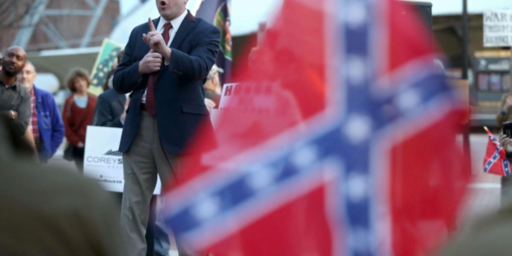
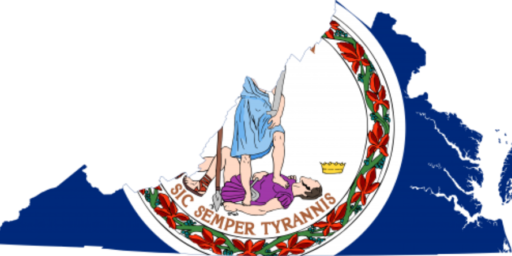
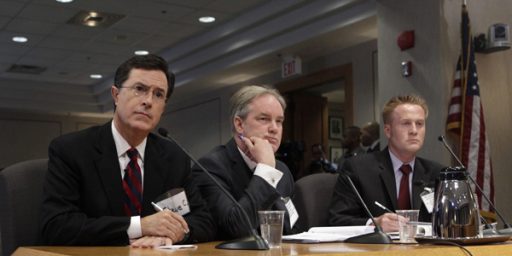
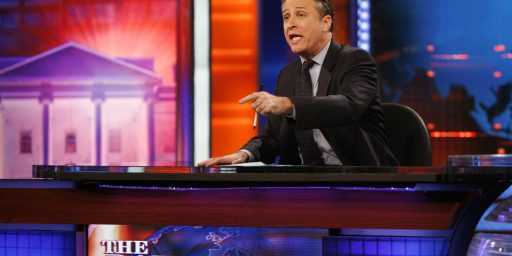

I watched the original with shock and awe.
I do see a parallel between Comedy Central telling truths and the old Soviet jokes. When a society is uncomfortable saying certain things publicly, only a joke can do it. This was probably most true at that very moment, at that event. The MSM was playing a game of “extend and pretend” with the WMD hunt, even as Bush was clowning, looking for WMDs under his desk. It was before the MSM started a long slow turn to a new worldview.
In these less stressful times Comedy Central is less about things the administration doesn’t want to hear and more about things the traditional media doesn’t want to say.
Colbert went after the President, Jon Stewart goes after Jim Cramer. It’s a different scale.
Maddow and Olberman come off as smarmy twits.
And yes, if you have seen enough Scalia interviews and opinions you wouldn’t be surprised at all about his appreciation of a little “bite.”
I, of course, would never do that.
Olbermann is a smarmy twit. Maddow’s not.
Maddow does real interviews, not the call-and-response that Keith practices. And she does real reporting. She’s largely responsible for growing awareness that right-wingers were backing a kill-the-gays bill in Uganda, for example.
I thought the exact same thing when I read that part of the article.
I dont watch any cable news, but I do watch Colbert when I can remember to do so. He is genuinely funny and smart. Much better than Stewart.
Steve
We DVR both shows. Stewart is quite good at what he does but he’s got a more limited set of gags that he recycles. Colbert has incredible range, as one would expect from someone’s who’s a trained performer (singer, actor, improv) rather than someone who came up in stand-up. And Colbert’s a genius whereas Stewart is merely incredibly talented.